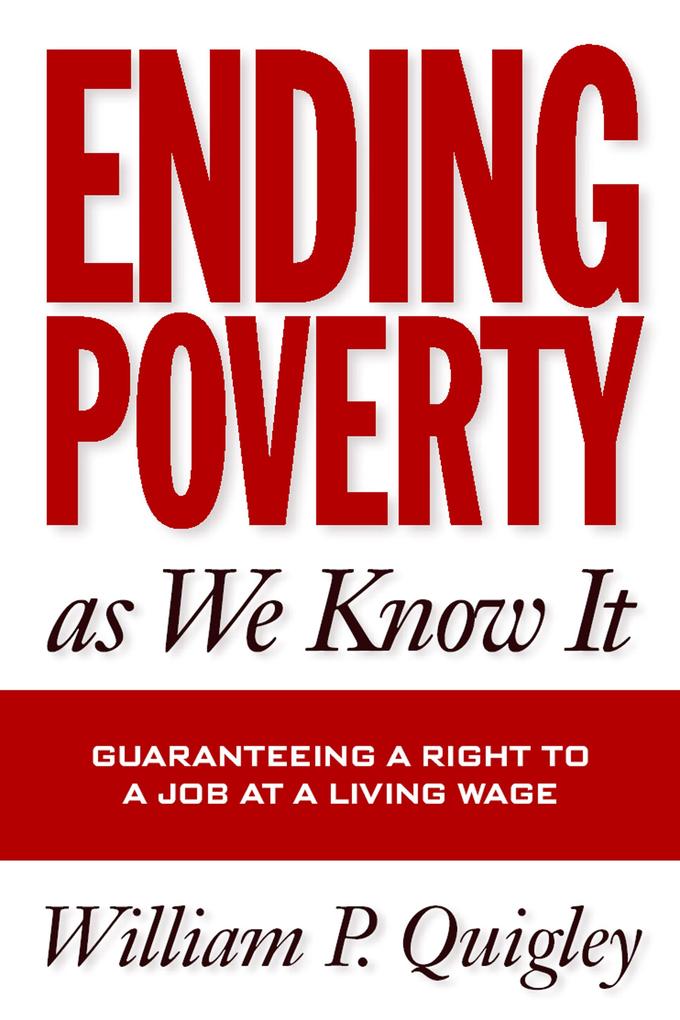
Zustellung: Di, 05.08. - Mo, 11.08.
Versand in 3-4 Wochen
VersandkostenfreiBestellen & in Filiale abholen:
In cities and counties across the country Americans are asserting their right to a job at a living wage. This campaign has been built around the idea that those who work full time are entitled to live above the real poverty line. Professor and public interest lawyer William Quigley, who helped lead the fight to give the workers of New Orleans a raise, presents the moral case for doing so, and argues that Americans should codify the right to a job at a living wage in the Constitution.
Inhaltsverzeichnis
Acknowledgments Part I: Introduction 1. Why a Right to a Job at a Living Wage? Part II: Reeducating Ourselves about What It Means to Be Poor 2. Myths and Facts about Poverty and Work 3. Our History Shapes Our Thinking 4. Current Official Definition of Poverty 5. A New Definition of Poverty Part III: Poverty and Lack of Work 6. The Extent of Unemployment and Underemployment 7. The Cost of Unemployment and Underemployment Part IV: Work and Poverty 8. The Working Poor 9. Low-Wage Work Part V: A Constitutional Right to a Job at a Living Wage 10. A Constitutional Amendment 11. Support for a Right to a Job 12. Support for a Right to Living Wages 13. How Might a Constitutional Amendment Work? 14. The Way to End Poverty as We Know It Notes Suggested Web Resources for Further Reading Selected Bibliography Index
Produktdetails
Erscheinungsdatum
01. Juni 2003
Sprache
englisch
Seitenanzahl
240
Autor/Autorin
William Quigley
Verlag/Hersteller
Produktart
kartoniert
Gewicht
417 g
Größe (L/B/H)
230/152/17 mm
ISBN
9781592130337
Pressestimmen
"Bill Quigley draws on the common sense of Thomas Paine, the moral inspiration of Martin Luther King, Jr., and the political wisdom of Franklin Delano Roosevelt to issue a bold challenge for our society: to guarantee people who want to work the right to a job at a living wage. In a brave and witty book that is both visionary and practical, Quigley reminds us that if once radical ideas like social security and the abolition of slavery can become realities, then the current partnership between poverty and work can be upended too." - Lani Guinier, Professor of Law and co-author of The Miner's Canary "Bill Quigley's book makes us believe that America can really change for the better and provide a decent job and a fair wage to hard-working families. This is a very important book. Bill brings a lifetime of knowledge and commitment to this; and he really shows us, step by step, how it can be done." - Sister Helen Prejean, social activist and author of Dead Man Walking "Quigley, an active public interest lawyer and law professor, makes a good case for a constitutional amendment that requires a living wage job for everyone. The living wage is currently about double the level of the current minimum wage, and would, with full-time employment, provide enough income for a family's basic needs. The living wage would thereby lift the working poor above the poverty level. Quigley discusses both the present poverty definition and his proposal for revising it to a higher level. While eliminating poverty is a utopian ideal, he believes it is possible. The author thoroughly discusses why his plan is needed and reports on public support for the living wage and for guaranteed employment opportunities. He does not discuss how political opposition to his plans can be overcome, however. While he believes that the US economy can be redirected to produce a maximum number of jobs, this reviewer is skeptical that the political will to implement the plan exists. Liberals will applaud the plan, while conservatives will oppose it because it expands government's role in the economy and reduces the need for personal responsibility. Nevertheless, a timely and interesting topic that makes for good reading. Summing Up: Highly recommended." - Choice "While it will not solve America's poverty crisis, Quigley's book stands as a call to arms to the American public to act, to think, and to consider his proposal not just for the sake of charity, but for the sake of the country." - Berkeley Journal of Employment and Labor Law
Bewertungen
0 Bewertungen
Es wurden noch keine Bewertungen abgegeben. Schreiben Sie die erste Bewertung zu "Ending Poverty as We Know It" und helfen Sie damit anderen bei der Kaufentscheidung.









